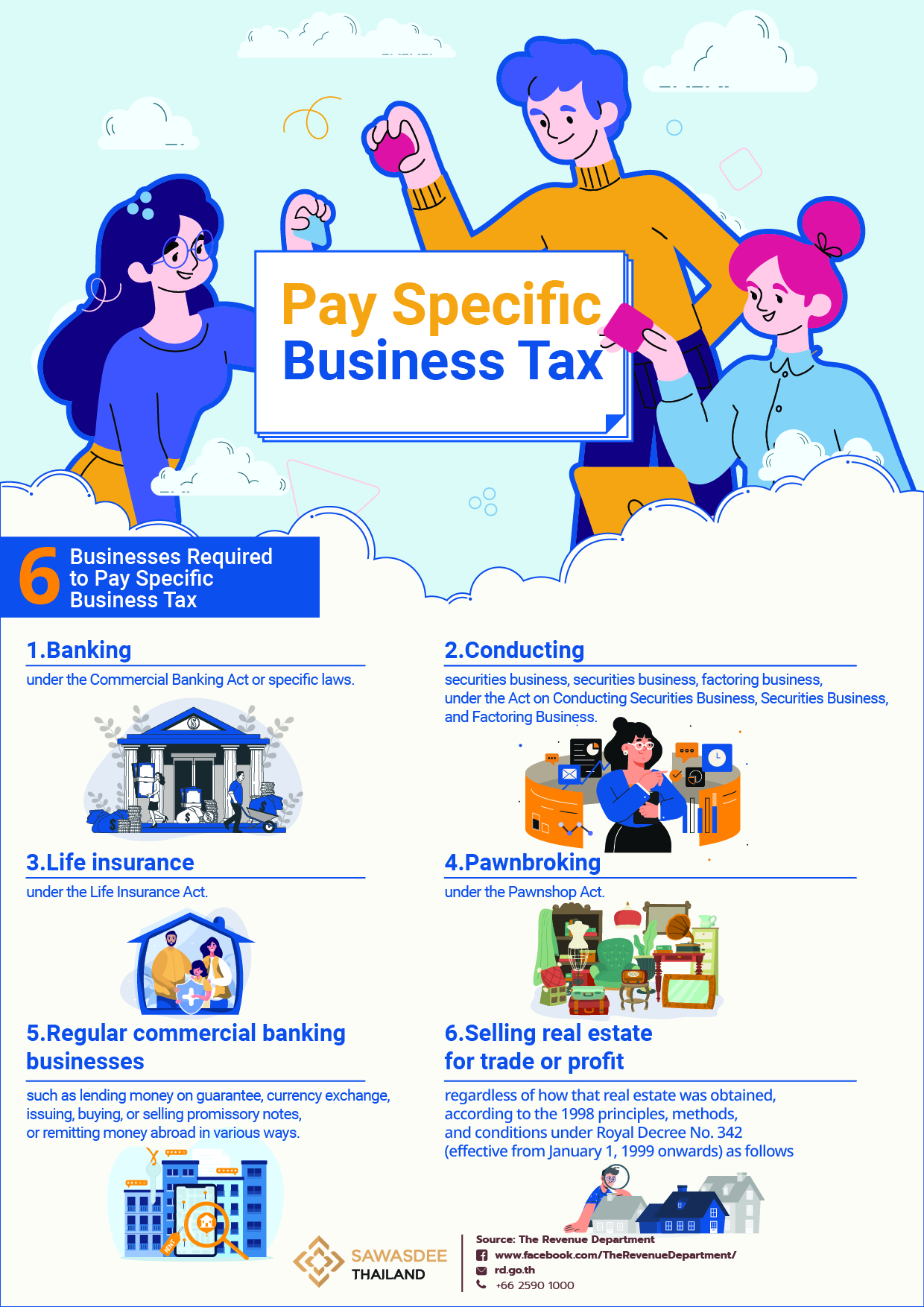
Specific Business Tax is one type of tax according to the Revenue Code, collected from specific types of businesses, replacing the abolished Commercial Tax. The 1992 Specific Business Tax was enforced in the year concurrently with the Value Added Tax (VAT).
The entities liable for Specific Business Tax include business operators subject to Specific Business Tax, regardless of whether such business operators conduct businesses in the form of:
In case the business operator is located overseas, the person responsible for conducting the business, including employees, representatives, or agents who have direct or implied power to manage within the Kingdom, is liable for tax jointly with the aforementioned business operators.
Those business operators liable for Specific Business Tax must register for Specific Business Tax by submitting form PhoThor.01 within 30 days from the commencement date of the business.
Businesses subject to Specific Business Tax include conducting the following businesses in the Kingdom, which are not exempt from Specific Business Tax:
The sale of real estate deemed to be for commercial or profitable purposes according to the Royal Decree includes the sale of real estate that must be registered for rights and legal actions, as follows:
(1) The sale of real estate by those authorized to allocate land under the law governing the control of land allocation.
(2) The sale of condominium units by business operators who apply for condominium registration under the law on condominiums.
(3) The sale of buildings constructed for sale, including the sale of land where such buildings are located.
(4) The sale of real estate that does not fit the criteria in (1), (2), or (3), but only in cases where the property has been divided for sale or separated for sale, with roads or other public utilities prepared, or a promise made to provide such facilities.
(5) The sale of real estate owned by companies or partnerships that are obliged to pay corporate income tax, government agencies, cooperatives, and other organizations designated by law as juristic persons for the specific operation of their businesses.
(6) The sale of real estate that does not meet the conditions in (1), (2), (3), (4), (5), if performed within 5 years from the date the property was acquired, except in the following circumstances:
(A) A sale or repossession under the law on property repossession.
(B) The sale of property acquired by inheritance.
(C) The sale of property used as a principal residence, where the seller's name is registered in the house registration under the civil registration law, for a period of not less than 1 year from the date of acquisition. In case the land and buildings or constructions according to (C) were not acquired at the same time, the 5-year period mentioned in (6) shall be counted from the time of acquiring the later property.
(D) The transfer of ownership or possession rights in property, without compensation, to the person's lawful child, excluding adopted children.
(E) The transfer of ownership or possession rights in inherited property to rightful heirs or beneficiaries who are rightful heirs.
(F) The transfer of ownership or possession rights in property to a government agency or organization without compensation.
(G) The exchange of ownership or possession rights in property with a government agency or organization, only in cases where the government agency or organization has not paid any compensation other than the property being exchanged.
Note: Individuals who have income from the sale of property under (6), which has been subject to withholding tax at the source and has already paid a specific business tax, shall be exempted from including such income in the calculation of assessable income when filing their income tax returns. This is to relieve the tax burden on individuals.
(7) The sale of securities in accordance with the law governing the Securities Market of Thailand, within the securities market.
(8) Other business operations as determined by royal decree.
It is established that the business of buying and selling securities back, licensed by the Securities and Exchange Commission, under the law on securities and the securities market, is subject to Specific Business Tax, due to the operation of buying or selling securities back. Such repurchase agreements or other characteristics are subject to Specific Business Tax.
It is stipulated that the operation of a factoring business is subject to Specific Business Tax, as the nature of such business operations is similar to lending money, a typical operation similar to commercial banking.
Data updated on November 16, 2020
Source: The Revenue Department, 90 Phaholyothin 7, Phayathai, Phayathai, Bangkok 10400
Tel. +66 2272 8000
